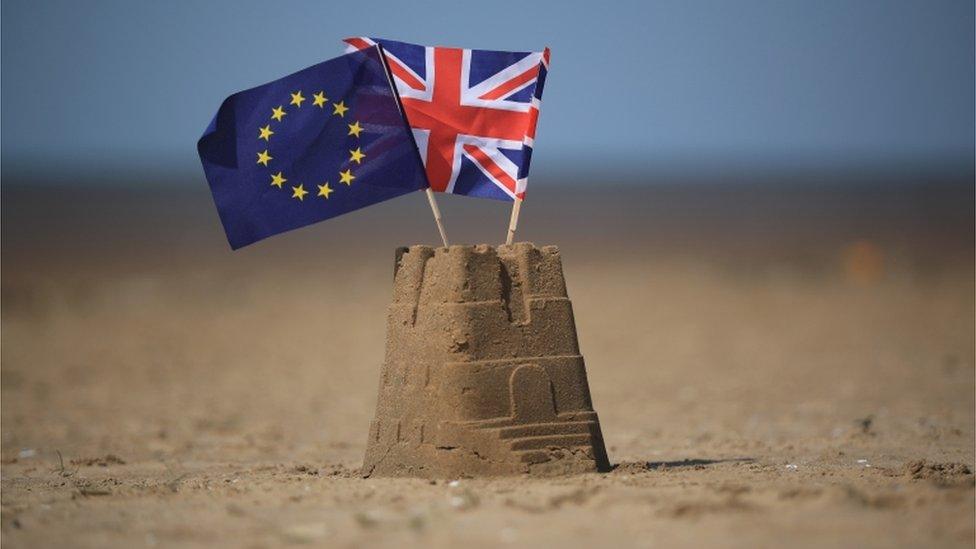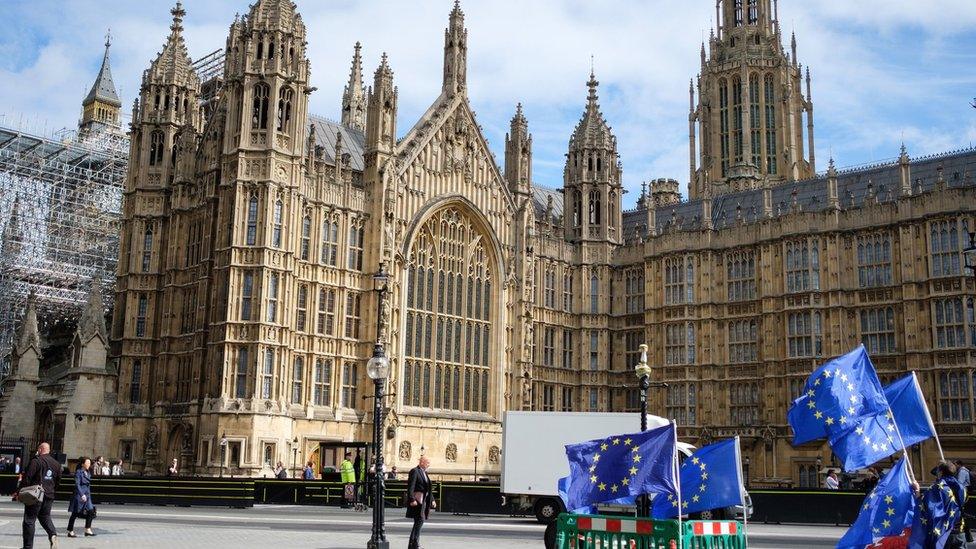EU Withdrawal Bill: A taste of things to come
- Published

The government wants to incorporate EU law into the UK statute book in time for Brexit
What is all the fuss about?
Listen to ministers and all they are trying to do is tidy up the paperwork, cross the t's and dot the i's. Listen to Labour and Theresa May is trying her luck as a despot, grabbing power in great chunks, never again to give our elected representatives the chance to argue or even consider what's being done on our behalf.
Guess what? As ever in politics the truth is somewhere in between, whatever the two sides say. We are leaving the EU in less than two years (pretty much inevitably unless something really surprising happens).
But much of our law is based on EU law and EU institutions. So when we leave, in theory we lose lots of law overnight, and much of it simply won't make sense any more in thousands and thousands of areas.
Harmless tweaks?
Sounds strange, but hypothetically that's what could happen. Right now the EU rules that have over the years been incorporated into our statute books govern everything from chemicals to beaches to immigration to animal welfare to aviation. This list goes on and on, and it is safe to assume EU law shapes pretty much everything.
The idea behind the Withdrawal Bill is therefore to cut and paste the lot into British law, so that we don't wake up the morning after we leave the EU in 2019 with a free-for-all.
So far, so uncontroversial. Here's the problem. The amount of stuff, the sheer volume of the rules and regulations that need to be transferred is so massive, basically our entire statute book, that the government says there is just no way there will be time to debate it all, let alone vote on every bit.
Their solution is to use so-called 'Henry VIII powers', evoking the image of a medieval monarch, ruling by whim and decree. In practice this could mean that on thousands of rules, regulations, ministers can make changes, whether harmless tweaks or suspicious alterations, without having to consult other MPs, let alone give them a vote.

Pro-EU demonstrators waved flags outside Parliament as MPs prepared to debate the bill
Crucially, it would allow ministers to change things where they think it is "appropriate", in theory that makes their decisions even exempt to legal challenge. As it stands, the bill also gives ministers the power to choose the day of our actual exit from the EU, without asking Parliament, and it could also give them the power to designate different days for Brexit in different legal areas.
There are therefore clear reasons for there to be nerves on all sides of the House of Commons about the bill.
Ministers accept privately that they will probably have to budge in some areas. But tonight's midnight vote is not likely to be the big showdown.
Tory rebels will, in the main, vote for the bill in principle, and enter hand-to-hand combat in the more detailed stages in the next couple of months. And although the opposition will vote against the bill this evening, there are also anxious MPs on that side of the House of Commons who won't, worried about appearing to be blocking Brexit by "killing the bill".
But tonight will be the first real taste of the months to come, the House of Commons sitting until midnight, the government anxiously totting up the numbers, MPs being told to cancel any plans they have to be around for vital votes.
Tonight's likely approval of the bill won't wash away the real concerns, and once it makes it to the House of Lords the battles could be even more fraught.
PS: Potential Tory rebels might find a little relief in this nugget. Despite reports that the government chief whip, Gavin Williamson, had acquired a second tarantula for his office, the better to torment his charges (yes he does have one), he told me this morning that in fact that is not the case. His spider, Cronus, is still his only office pet.
- Published6 September 2017

- Published6 September 2017
